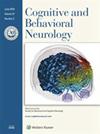New Frontier: The First Year of an Adult Neurodevelopmental Disabilities Clinic
IF 1.7
4区 医学
Q4 BEHAVIORAL SCIENCES
引用次数: 0
Abstract
As patients with neurodevelopmental disorders (NDDs) transition from pediatric to adult health care systems, they often have difficulty finding physicians to address their NDD-related needs. In response to this care gap, we established a new consultation clinic within a behavioral neurology clinic in an adult neurology department to address the neurodevelopmental concerns of these adult patients. To characterize the population of adult patients with NDDs seen in the adult NDD clinic in its first year. Data were obtained by a retrospective chart review of all patients with NDDs seen in the adult NDD clinic from September 2020 through December 2021. Of the 86 patients who were seen in the adult NDD clinic, the average age was 34 years (SD = 15, range = 18–74 years). Developmental diagnoses included intellectual disability (63%), autism spectrum disorder (47%), Down syndrome (15%), cerebral palsy (9%), and other genetic disorders (26%). Comorbidities addressed included behavioral concerns (34%), anxiety (29%), seizure disorders (22%), and depression (15%). Behavioral and/or mental health concerns prompted 65% of the initial clinic visits. The most common recommendation made was to begin or increase exercise (59%), followed by facilitating connection to community, social, and employment resources. Adults with NDDs have diagnoses, comorbidities, and concerns that are similar to, but also distinct from, those addressed in other adult neurology clinics. This study addresses the need for, and feasibility of, caring for the diverse population of adults with NDDs in an adult neurology setting.新领域:成人神经发育障碍诊所的第一年
随着神经发育障碍(ndd)患者从儿科过渡到成人卫生保健系统,他们往往很难找到医生来满足他们的ndd相关需求。为了弥补这一护理缺口,我们在成人神经科的行为神经病学诊所内建立了一个新的咨询诊所,以解决这些成年患者的神经发育问题。在成人NDD诊所第一年观察到的NDD成人患者的特征。数据是通过对2020年9月至2021年12月在成人NDD诊所看到的所有NDD患者的回顾性图表审查获得的。在成人NDD门诊就诊的86例患者中,平均年龄为34岁(SD = 15,范围= 18-74岁)。发育诊断包括智力障碍(63%)、自闭症谱系障碍(47%)、唐氏综合症(15%)、脑瘫(9%)和其他遗传疾病(26%)。共病包括行为担忧(34%)、焦虑(29%)、癫痫发作(22%)和抑郁(15%)。行为和/或心理健康问题导致65%的初次就诊。最常见的建议是开始或增加锻炼(59%),其次是促进与社区、社会和就业资源的联系。患有ndd的成人的诊断、合并症和关注点与其他成人神经病学诊所的诊断、合并症相似,但又不同。本研究探讨了在成人神经病学环境中护理不同人群ndd患者的必要性和可行性。
本文章由计算机程序翻译,如有差异,请以英文原文为准。
求助全文
约1分钟内获得全文
求助全文
来源期刊
CiteScore
2.40
自引率
7.10%
发文量
68
审稿时长
>12 weeks
期刊介绍:
Cognitive and Behavioral Neurology (CBN) is a forum for advances in the neurologic understanding and possible treatment of human disorders that affect thinking, learning, memory, communication, and behavior. As an incubator for innovations in these fields, CBN helps transform theory into practice. The journal serves clinical research, patient care, education, and professional advancement.
The journal welcomes contributions from neurology, cognitive neuroscience, neuropsychology, neuropsychiatry, and other relevant fields. The editors particularly encourage review articles (including reviews of clinical practice), experimental and observational case reports, instructional articles for interested students and professionals in other fields, and innovative articles that do not fit neatly into any category. Also welcome are therapeutic trials and other experimental and observational studies, brief reports, first-person accounts of neurologic experiences, position papers, hypotheses, opinion papers, commentaries, historical perspectives, and book reviews.

 求助内容:
求助内容: 应助结果提醒方式:
应助结果提醒方式:


